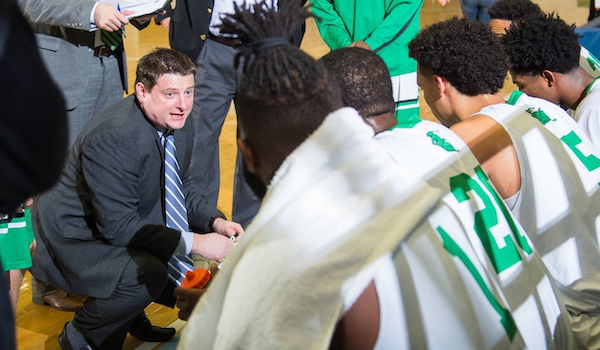In 2014, Kyle Tolin left the familiarity of Oklahoma Baptist University, after a combined 14 years as an Assistant Men’s Basketball Coach and a student-athlete, to take over the University of Arkansas at Monticello program. Having helped lead OBU to 14 straight NAIA Tournament berths (won the 2009-10 NAIA National Championship), Tolin was well-prepared to guide UAM to similar success. Since his arrival, Tolin has done just that, having led UAM to the program’s first conference championship in more than 60 seasons.
What strategies did you implement when you took over the program at Arkansas-Monticello that resulted in the second most single-season and most conference wins in program history in 2016-17?
There were several strategies that we tried to implement when we took over at UAM. I spent a lot of time studying our University, community, and conference trying to figure out what ways we could be successful. Every program and community has a certain DNA about themselves and there is something positive about every university. I tried to find the positives and figure out what type of student-athletes would be a good fit at UAM.
If you’re going to have a successful program, you have to have good players. I spent a lot of time recruiting. This was an important piece in the process of figuring out how to be successful here at UAM.
I also tried to get the community involved in our program. We wanted to create a buzz about UAM Basketball and get as many people on board as we could. We also wanted to get the support from people on campus and our administration. We wanted them to know that we are all in this together and all have the same common goal; to help young students reach their goals and be successful.
Without having the staff salary pool that most Division I programs have, what are important strategies you utilize or qualities you look for when filling an Assistant Coach position on your staff?
I think it’s important to find the right people on your staff, especially at the DII level. I have spent a lot of time trying to find the right person. I did thorough research, interviewed candidates, and checked references in hopes of finding the right Assistant Coach. You have a small staff so one of the most important qualities in hiring is finding someone that can wear many hats and has a wide range of skill sets. I think finding someone who understands the small college level is important, because the way you do things is a little bit different. It is important to find someone who has good character and a strong work ethic. Also, find someone you genuinely enjoy being around because you spend as much time with them as you do your family.
What have you learned over your five seasons as a DII Head Coach that you wish you knew when you first accepted the position?
I have learned so much after five years as a head coach at the Division II level. I think one thing I learned is how to be an effective coach. As an Assistant Coach, you do so many different things to help the program on a daily basis. After being an Assistant Coach for ten years, I felt like I had enough experience and was ready to take over a program. When I took my first head coaching job, I had a lot of ideas from people I have worked for in the past, but there are so many different things you learn through experience.
One thing I wish I knew five years ago when I first started as a Head Coach was how to delegate. I was used to doing almost everything as an Associate Head Coach. I handled all of the recruiting, academic responsibilities, day to day operations of the program, and scouting reports. When I took over at UAM, I was trying to do everything just like I had in the past. That is just too hard to do with everything else that comes along with being a Head Coach.
Another thing I wish I would have known at the time is just to be myself. I needed to spend time getting to know the players I wanted to coach and the ideas that I wanted to implement. It also takes some time to self-reflect as a Head Coach and figure out what things are working and where modifications need to be made. We are always asking our players to correct mistakes on a daily basis. I learned to be better about correcting my own mistakes as well.

